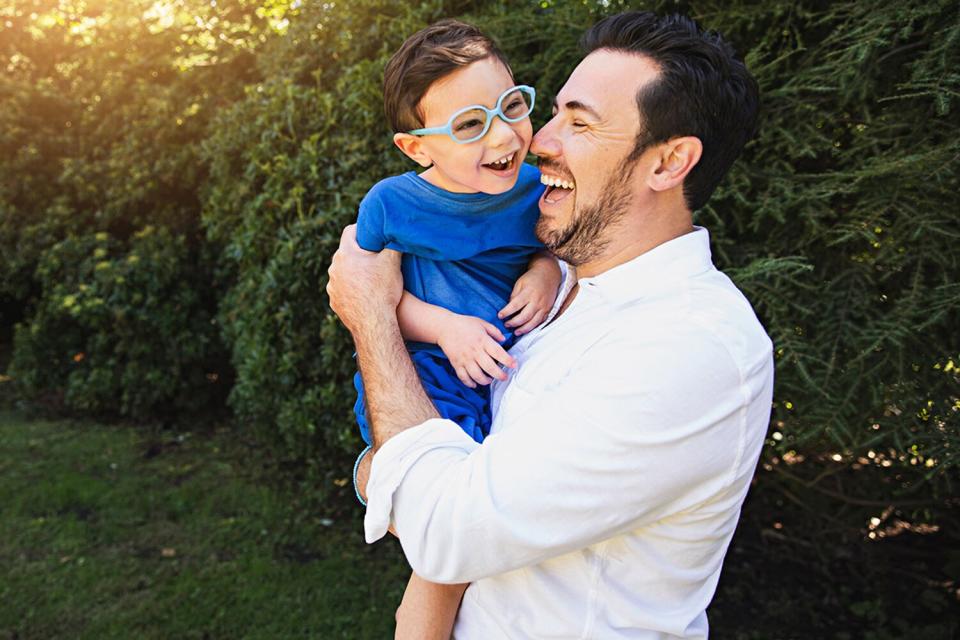How One Family Found Hope Amid the Pain of Their Son's Rare Brain Disorder: 'There's Going to Be a Better Day'

Rebecca Brookstein
Nearly three years ago, desperate to understand why their infant son Eli cried for hours on end and couldn't sleep, Ilissa and Scott Reich found themselves in a doctor's office facing a devastating diagnosis: Eli had a rare brain disorder and would likely never walk or talk. His life expectancy was unknown. "The geneticist said, 'I'm sorry. There is no cure. There's no hope. Go home and love him,' " Ilissa, 38, tells PEOPLE in this week's issue. "I died inside."
What the Port Washington, N.Y., couple couldn't have imagined in that moment of shock and grief was just how much joy and purpose Eli, now 3, would bring to their family. "He's helped reshape our values and become better people," says Scott, 39, a corporate lawyer who threw himself into learning about Eli's condition—FOXG1 Syndrome, a gene abnormality affecting only about 700 people worldwide—by starting the nonprofit Believe In a Cure to fund and advocate for research. "We decided we weren't going to accept there was no answer. We were going to find an answer. I've devoted my life to trying to develop a treatment — and the clock is ticking."
For now, Eli's limitations mean that each day can be a challenge. "He suffers from seizures, and it's difficult to feed him, so he can't eat outside our house," says Ilissa, a former fashion industry executive who stopped working to take care of Eli. "And every time a seizure happens, you can't help but think, 'Is he going to come back from this?"
RELATED STORY: Boston Family Is Fundraising for Treatment for Son, 2, Who Has Rare Disease: 'Terror and Grief'

Rebecca Brookstein
And yet, caring for Eli has created strong bonds among the family — and some silver linings. "This isn't just a journey for Eli. It's a journey for all of us," Scott says. Ilissa, who put her anguish to action by starting a support group for parents with special needs, says the experience "has brought me and Scott closer. We relate to each other in a way that no one else can understand."
Eli's siblings, nearly 5-year-old Emelia and one-year-old Dylan, also have a special connection to their brother. Emelia, who proudly wears a bracelet bearing her brother's name, "has become this unbelievably sympathetic girl, says Ilissa. "She just wants to hug and love and take care of everybody." Intimately familiar with the rhythm of Eli's 20-plus weekly therapy and doctor appointments (including speech therapy, occupational therapy, physical therapy and aquatherapy), Emelia "literally gets on the floor with him and does his exercises with him," Scott says.
For more on Eli's journey, pick up the latest issue of PEOPLE, on newsstands Friday, or subscribe here.
And when Dylan is in a room with Eli, "the only place he wants to be is climbing on Eli's's wheelchair to touch him," says Scott. "A lot of our day is defined by helping Eli navigate challenges. But when he smiles or laughs at his sister or his brother, there's something magical about it."
Yet, even that can be bittersweet, says Ilissa: "He has an unbelievable smile but when I see it, it's such a crazy mixture of your heart breaking thinking, 'I love you so much — and you don't deserve this."
RELATED STORY: Rhode Island Family Is Fundraising for a Cure for 2-Year-Old's Degenerative Disorder: 'Hard to Watch'
So, the couple does whatever they can to make Eli's life better, including continuing a therapy regime that can be "overwhelming," Scott says. "We want to give him every chance to improve." And they try to celebrate the small victories. "He recently started being able to transfer a toy from one hand to another," says Scott. "I know that sounds small. But he still can't sit up. He can't communicate at all. He can't point to anything to show that something hurts. He can't signal that he wants to drink water So it's humongous for him."
With so little known about Eli's disorder, the Reich family realizes the future is uncertain. But thinking about how much time they may — or may not— have with Eli "is not constructive," Scott says. "We're forced to live in the moment and that's been an odd benefit of this terrible journey. We've had to get comfortable being uncomfortable. And we are going to will something to happen. I feel in my bones there's going to be a better day."
And the couple say they are determined to pass on a legacy of hope and perseverance to their children. "We live with hope alongside pain — these two things help define our family," Scott says. Adds Ilissa: "I want to show our kids that we were pushed down hard and given something I'd never wish upon anybody, but we're standing on our feet."
To learn more about FOXG1 Syndrome and support research, go to: http://www.webelieveinacure.org/donate

 Yahoo Finance
Yahoo Finance 